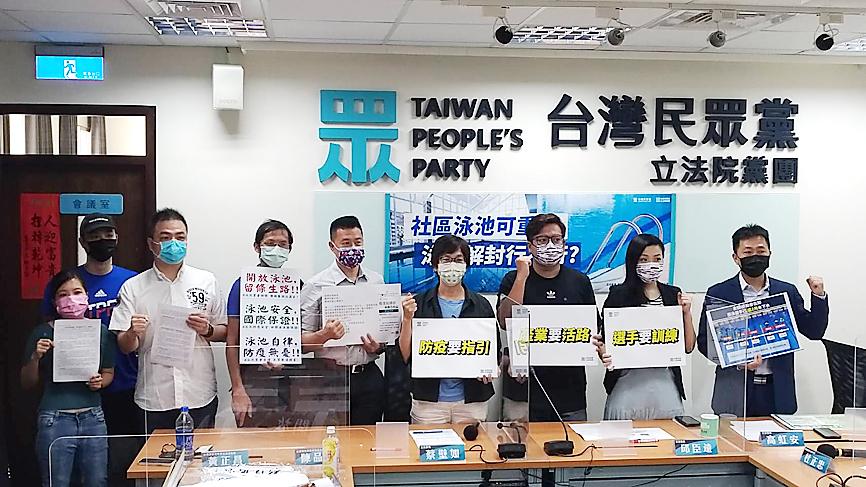Swimmers and pool owners yesterday appealed to the government for guidelines to reopen aquatic centers, as restrictions amid COVID-19 alerts are threatening the swimming pool industry and training regimens.
At a news conference hosted by Taiwan People’s Party (TPP) lawmakers, pool owners said that on Tuesday they would lodge a formal petition with the Ministry of Health and Welfare.
Pools have been closed since a nationwide level 3 COVID-19 alert was imposed on May 19, they said, adding that despite the government on Tuesday lowering the alert to level 2 and lifting some restrictions, pools were not given any leeway.

Photo provided by the office of Taiwan People’s Party Legislator Tsai Pi-ru
Support for the petition shows that many pool owners are on the brink of financial ruin, said Lin Kuei-ku (林歸谷), who initiated the petition.
We would love to give the government more time to look into possible measures, but we cannot wait more than one week, Lin said.
Swimmer Hsu Han-peng (許涵棚) and a coach, Huang Chiao-le (黃巧樂), said that they hoped to return to training.
Swimmers must train in the water — weight training is not enough, they said.
TPP Legislator Tsai Pi-ru (蔡壁如) said that “water-resistant” masks should be developed for swimmers, as well as other measures to shield them after they exit the pool.
TPP Legislator Chiu Chen-yuan (邱臣遠) said that if pools are not allowed to reopen in the summer — when they make most of their money — there might be mass closures of such facilities nationwide.
The government’s haste to show support for sports by congratulating athletes at at the Tokyo Olympics is undercut by their lack of attention to domestic athletes, TPP Legislator Anne Kao (高虹安) said.
Tainan’s team are considering not attending the National Games, as their swimmers could not train for the event, Kao said.
Suitable relaxation of regulations, as adopted at the Tokyo Olympics, should be referenced so that athletes’ training does not go to waste, she said.
Taiwan Swimming Pool Association president Huang Cheng-chang (黃正昌) and WDYG Corp chief executive officer Tu Cheng-chung (杜正忠) — citing the WHO, the US Centers for Disease Control and Prevention and the British National Health Service — said that COVID-19 infection is mitigated when swimming as long as preventive measures are followed and the water is sufficiently chlorinated.
Swimmers are usually spaced such that they exceed the recommended 5m of social distance, Tu said, adding that there is no reason for pools to remain closed while gyms have been allowed to reopen.

Eight restaurants in Taiwan yesterday secured a one-star rating from the Michelin Guide Taiwan for the first time, while three one-star restaurants from last year’s edition were promoted to two stars. Forty-three restaurants were awarded one star this year, including 34 in Taipei, five in Taichung and four in Kaohsiung. Hosu (好嶼), Chuan Ya (川雅), Sushi Kajin (鮨嘉仁), aMaze (心宴), La Vie by Thomas Buhner, Yuan Yi (元一) and Frassi in Taipei and Front House (方蒔) in Kaohsiung received a one-star rating for the first time. Hosu is known for innovative Taiwanese dishes, while Chuan Ya serves Sichuan cuisine and aMaze specializes

STATS: Taiwan’s average life expectancy of 80.77 years was lower than that of Japan, Singapore and South Korea, but higher than in China, Malaysia and Indonesia Taiwan’s average life expectancy last year increased to 80.77 years, but was still not back to its pre-COVID-19 pandemic peak of 81.32 years in 2020, the Ministry of the Interior said yesterday. The average life expectancy last year increased the 0.54 years from 2023, the ministry said in a statement. For men and women, the average life expectancy last year was 77.42 years and 84.30 years respectively, up 0.48 years and 0.56 years from the previous year. Taiwan’s average life expectancy peaked at 81.32 years in 2020, as the nation was relatively unaffected by the pandemic that year. The metric

Taitung County is to launch charter flights to Malaysia at the end of this year, after setting up flights to Vietnam and Thailand, the Taitung County Government said yesterday. The new charter flight services, provided by low-cost carrier Batik Air Malaysia, would be part of five-day tour packages for visits to Taitung County or Malaysia. The Batik Air charter flight, with about 200 seats, would take Malaysian tourists to Taitung on Dec. 30 and then at 12:35pm return to Kuala Lumpur with Taiwanese tourists. Another charter flight would bring the Taiwanese home on Jan. 3 next year, arriving at 5:30pm, before taking the

Taiwan High Speed Rail Corp. (THSRC) plans to ease strained capacity during peak hours by introducing new fare rules restricting passengers traveling without reserved seats in 2026, company Chairman Shih Che (史哲) said Wednesday. THSRC needs to tackle its capacity issue because there have been several occasions where passengers holding tickets with reserved seats did not make it onto their train in stations packed with individuals traveling without a reserved seat, Shih told reporters in a joint interview in Taipei. Non-reserved seats allow travelers maximum flexibility, but it has led to issues relating to quality of service and safety concerns, especially during